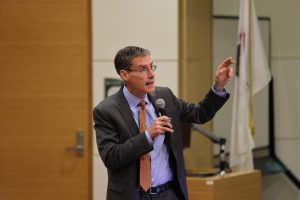Developmental math continues to necessitate much concern

September 14, 2016
Six years of stats add up to one key truth about College of DuPage students: They just aren’t that good at math.
In the fall semester of 2010, only 43 percent of roughly 4,500 College of DuPage students successfully completed their developmental math courses. By the fall of 2014, the student success rate jumped to 59 percent, leaving COD in the 51st percentile compared with community colleges across the nation. Although there has been a marked improvement since 2010, faculty, administration and political leaders continue to search for new solutions to an epidemic of math reluctance.
When Tom Schrader became associate dean of math and physical sciences in July of 2010, one of the first barriers to success he saw developmental math students facing was the committee-created comprehensive final exam. Common across all sections of MATH 0481 and 0482, which cover basic and intermediate algebra, every class received the same standardized test.
“Students were failing that final exam at a tremendous rate because it was so unfamiliar to them,” Schrader said. “Throughout the semester, they would get used to the format and styling of their specific professor’s tests. So when all of a sudden they’re presented with this standardized test that’s worth 40 percent of their grade, yeah, it’s definitely going to create some problems for them in terms of performance,” Schrader explains.
By switching to instructor-created final exams, Schrader and the developmental math faculty saw an improvement right off the bat. Although many factors went into the jump in success since 2010, Schrader attributes this restructuring of the final exam as a main contributor.
COD requires students to take non-credit developmental math courses if they do not meet the qualifications for college-level math. Only after passing the developmental classes can students begin to work towards earning their college math credits. Currently, students must have a 21 or higher on their ACT or a passing grade on the placement test upon enrolling at COD in order to take college level math.
According to illinoisreportcard.com, in 2015, 43 percent of high school graduates in district 502 were not ready for college level math, based on their ACT scores of 21 or lower.
“Basically, the main problem that we’re seeing is that students are not prepared to take college-level math when they graduate from high school,” Schrader said.
However, beginning next year, the college will no longer use ACT scores to determine whether students are qualified for college-level math. Instead, the ALEKS (Assessment in Learning in Knowledge Spaces) Platform will be put into motion. ALEKS is a web-based, artificially intelligent assessment and learning system that uses adaptive questioning to more accurately evaluate what a student does and doesn’t know.
“ALEKS differs from the ACT in that it doesn’t just label students with a number,” Schrader said. It offers a more holistic approach to inform students what specifically they need improvement on, and what they already know.”
Another growing concern is the fact that high schools don’t require their students to take math all four years to graduate. The issue has been previously addressed by former Illinois Lt. Gov. Sheila Simon. Trustee Dianne McGuire brought the point up during the Aug. 29 board meeting that Simon had worked to pass legislation that would require students to remain in math classes throughout their senior year of high school. However, it was not passed.
“That year off may seem like nothing at the time,” McGuire stated. “But when students come into their first year of college and find themselves taking that math placement test, it’s like a foreign language.”
Schrader believes that changes need to be made at the most basic level when children are first introduced to math in order to achieve sustainable improvements for the future.By the time students reach the college level, if the fundamentals of basic math concepts are missing, the chances of success in college level math courses are slim to none.
“By the time I leave or retire from COD as associate dean, if there was one thing I would want to see happen it would be to have math specialists working in at least one of our elementary schools. Similar to how art teachers and gym teachers operate at elementary schools, why not have a teacher specifically designated for math? We certainly have the data to support making such a change.”


















